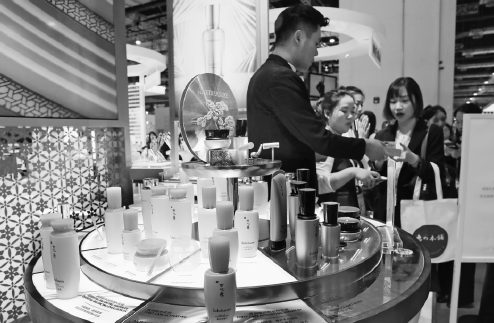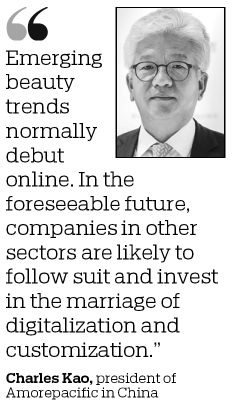Amorepacific mines beauty from e-commerce, charity
Charles Kao shapes South Korean cosmetics firm's China strategy to exploit online sales

What slowdown? The cosmetics industry, notably people's craving for foreign beauty brands, is in the midst of an apparent boom, bucking the slowing economic growth.
Eclipsing lackluster spending tides in sectors like food and beverages, makeup sales revenue from imported lipsticks to eyeliners this year rose 28 percent year-on-year, outstripping the nearly 10 percent growth rate of the overall fast-moving consumer goods sector, according to latest figures by consultancies Bain and Kantar Worldpanel.
Charles Kao, 58, China president of South Korean cosmetics group Amorepacific, will likely welcome the trend: the company recorded staggering sales during the Nov 11 online shopping carnival.
Ten of its brands participating in the gala saw sales surge 62 percent from a year ago, with its Sulwhasoo, Laneige and Innisfree brands each netting over 100 million yuan on that day.
But in the eyes of Kao, who has worked with major international beauty brands for over 20 years, the 11-11 extravaganza represents more than product discounts-it is a unique opportunity to tap into the vast Chinese consumer market that has seen increasing sophistication in the past few years.
"It is an occasion where brands find their positions and enhance customer engagement," he said, referring to the 2.6 million new customers the company enlisted, thanks to the 24-hour e-shopping festival.
China accounted for about one-fifth of Amorepacific's 6.78 trillion won ($5.84 billion) revenue last year, and a lion's share of its overseas sales outside of home turf. The shifting needs and preferences of local digital-savvy consumers found reflection in their product research and purchases done online.
Kao, embraced China's burgeoning e-commerce back in 2013 when he took the helm of Amorepacific's China business. He oversaw the opening of the official online stores of its multiple brands at a time when digital shops were not perceived as a prerequisite to success but seen as potentially eroding the premium image of established brands.
"Digitalization has been an ongoing area of investment for us in the past several years," said Kao. "E-commerce is an avenue we value a lot and will be our business focus from now on."
Today, Amorepacific's digital push isn't confined to registering record sales-it aims to implement the "In China for China" ethos through customized product co-creation powered by consumer insights.
This is best exemplified by the recent setup of a dedicated office with Chinese internet giant Alibaba in Hangzhou. The aim is to incubate new products tailored to the Chinese market, facilitate online-to-offline sales, gain precise consumer insights and explore opportunities in overseas markets.
"For new product launches in China, we are moving from 'intuition-driven readiness' to the employment of data that depicts the clear preferences of customers," said Kao, under whose leadership the group has seen nearly 30 percent of revenue generated through online channels.
Ideally, the Amorepacific-Alibaba office is designed to shorten the average length for new product introduction to six to nine months, from the typical 24 months taken by many Japanese and South Korean cosmetic companies, said Hu Weixiong, general manager of fast-moving consumer goods practice at Alibaba's Tmall site.
"In the early stage, the office can enhance coordination between Alibaba and Amorepacific's headquarters and hopefully speed up the decision-making process for the introduction of new products in China," said Hu.
Under such an initiative, the first batch of two co-created skin care products, banking on data feeds that track people's favored formula and packaging, is scheduled to debut in China early next year, Kao noted.
Navigating the world's second-largest consumer market has never been easy. The CEO highlighted the dual focal points for the next phase of growth: deployment of both high-end and mass market products.
A divergence of customer preference is clearly emerging. Young Chinese consumers are willing to pay more for high-quality items and services. "Therefore, we are investing heavily on enhancing immersive experience in the premium product line, such as the spa services in our Sulwhasoo storefronts," he said.
At the same time, small-town youngsters form a new growth point for the industry with 7.8 percent year-on-year growth in spending in 2018, according to consultancy Kantar Worldpanel.
Online sales of beauty products, including cosmetics and personal care, in small towns soared 38 percent in 2018, double the growth rates in big cities.
To harness such a trend, Amorepacific has enhanced its mass market offerings both online and offline. It is also looking to leverage a wide array of social media apps from Douyin, Kuaishou to Bilibili, to tap into the emerging consumer group who generally have more spare time watching content streamed online.
"Emerging beauty trends normally debut online. In the foreseeable future, companies in other sectors are likely to follow suit and invest in the marriage of digitalization and customization," said Jason Yu, general manager of consultancy Kantar Worldpanel China.
Kao doesn't feel like being shackled to his brightly-lit office in downtown Shanghai, making decisions purely based on data and research reports. Rather, he embarks on trips to the country's inland cities and talks to beauty assistants and local shoppers for first-hand feedback and insights.
That's his guiding principle for not only business operations but philanthropic endeavors. Under a project dubbed "Make Up Your Life", Kao led his team to seven impoverished townships across five provinces, overseeing free cervical and breast cancer screening examinations for more than 70,000 women.
Joining hands with the China Women's Development Foundation, the company, since 2016, has spent 38 million yuan so far not just conducting checkups and health-related lectures, but hosting regular charity sales, fund-raisers, and classes teaching skin care and makeup skills to those who had undergone surgeries.
Kao said he is mulling introduction of more diverse corporate social responsibility programs in China, such as a women empowerment project aiming to equip those with relatively low income with professional capabilities in training, career path, and even financing.
Asked about the secret of staying refreshed in light of his packed schedules, Kao said: "It's the magic of the beauty industry."


Today's Top News
- Trump threatens 10% tariffs on 8 NATO allies
- PLA monitors US naval vessels transiting the Taiwan Strait
- The high cost of US cutting vaccine funding
- Visit highlights China's importance
- China fortifies energy security as risks rise
- Taiwan separatists warned of action






























